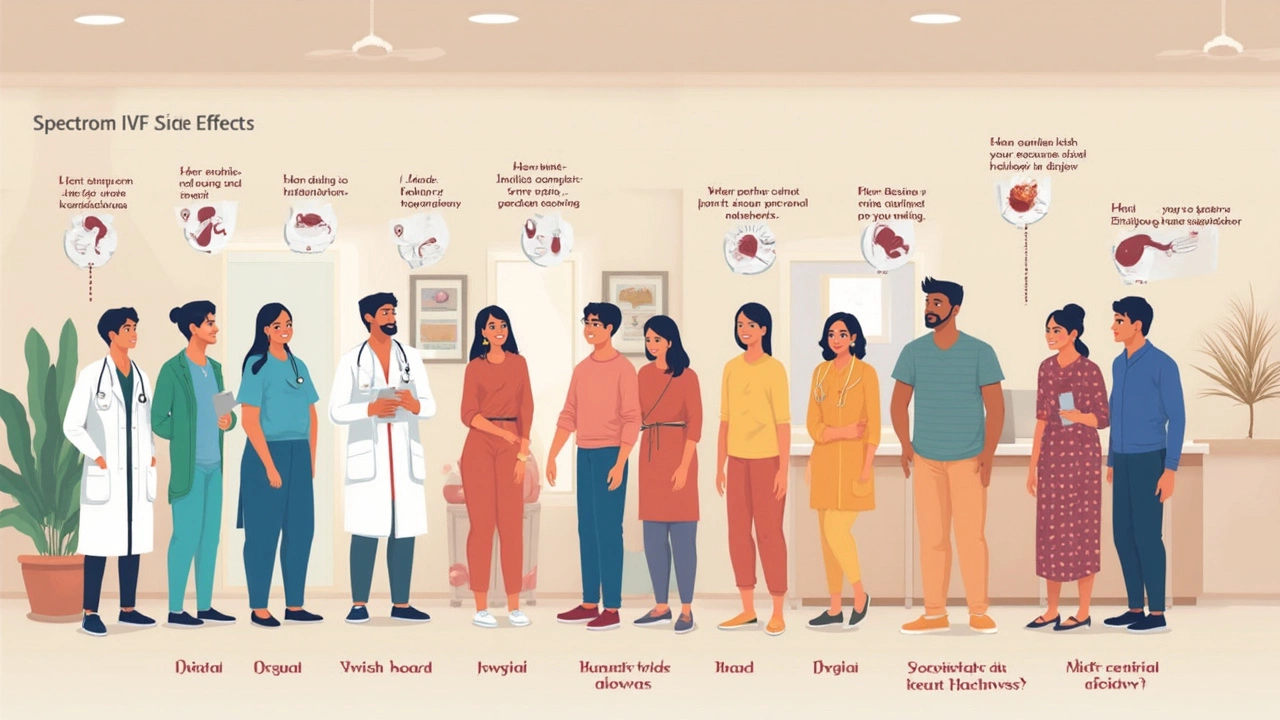
Would you let a doctor inject you daily if it meant a shot at having a baby? For millions, that’s not just a hypothetical—it’s just Tuesday. IVF, or in vitro fertilization, promises hope where hope once wavered. But there are things they don’t always say in the glossy clinic leaflets. You’ve seen celebrities announce their miracle babies and maybe wondered, “How hard could it be?” The story behind closed doors is a bit more complicated, messy, and honestly, sometimes pretty uncomfortable.
Physical Side Effects: The Real Body Changes You’ll Notice
First up, the basics. IVF is not a single procedure but a saga—a marathon of hormone shots, monitoring, blood draws, and interventions designed to coax your body into producing eggs on a schedule. One of the top side effects is bloating that can make you feel like you ate three Thanksgiving dinners. The culprit? Ovarian stimulation drugs, usually a daily injection for 8-14 days. 68% of IVF users report moderate to severe bloating during stimulation, according to a 2022 European fertility registry report.
Nausea tags along for plenty. If you’ve ever battled morning sickness or bad food poisoning, you’re in that ballpark. Some folks need anti-nausea meds just to get through the two weeks between egg retrieval and embryo transfer. Headaches pop up too, mainly due to surging estrogen levels. A study from Harvard Medical School found almost 30% of IVF patients have moderate headaches during the early stimulation phase.
Bruising is one of those quirky, unexpected side effects that isn’t dramatic but is annoyingly constant. Those hormone shots go into your belly, thighs, or even upper arms, so black-and-blue patches start to look like abstract art in your bathroom mirror.
After egg retrieval, mild cramping and pelvic soreness are normal. It’s basically a tiny surgery, with a needle going through the vaginal wall into the ovaries. Not a spa day, but usually nothing that a heating pad and rest can’t fix. For most, this soreness peaks 1-2 days post-retrieval and fades pretty fast.
Spotting or light bleeding is common after procedures, like retrieval or transfer. Most clinics have you wear a pad (never a tampon, for infection risk) for a couple of days until it passes.
Here’s a quick look at how common some of these physical symptoms really are:
| Side Effect | % Reporting (Based on Studies 2020-2023) |
|---|---|
| Bloating | 68% |
| Nausea | 40% |
| Headache | 30% |
| Pain/Cramping post-retrieval | 42% |
| Bruising | 35% |
Short-term, these symptoms rarely get in the way of daily life. But if your period pain is usually mild, IVF-related cramps can feel like a rude awakening.
Hormones and Mood: What Actually Happens in Your Head
No sugarcoating: IVF messes with your head. When you’re taking hormone injections, it’s not just your ovaries working overtime—your emotions ride a rollercoaster. Estrogen and progesterone are the main characters here, and when their levels spike quickly, so can your mood swings.
Anxiety is super common, even before factoring in the stress of “Will this work?” Moments that wouldn’t usually faze you—like a random work email or a rerun of Friends—might suddenly set you off. Partners sometimes walk on eggshells, unsure which version of you they'll get that hour. A 2021 British Fertility Society survey found that 57% of IVF patients described their mood as “irritable or tearful” during treatment.
Tiredness can hit hard. Some folks say it feels like a wet blanket over your day. Low energy, needing extra naps, sleeping poorly—that’s the cocktail stirred up by all those fertility drugs.
On the flip side, some women report experiencing a “mental clarity” in the waiting periods, thanks to all the focus on their bodies and health. But that’s less common. More often, the uncertainty and frustration add up. 22% of women in an Australian trial admitted to abandoning cycles midway because the mental toll was overwhelming—not because of physical pain, but pure psychological exhaustion.
Tip: Building your support squad makes a real difference. Most clinics now offer counseling, group chats, or patient liaisons who’ve done this themselves. Your mental health deserves as much care as your ovaries.

The Scarier Stuff: Rare But Serious Complications
Now for the things you hope you’ll never have to read about. The one talked about in hushed tones on IVF forums is Ovarian Hyperstimulation Syndrome (OHSS). Basically, those meds can push your ovaries into overdrive, making them swell, leak fluid, and cause major abdominal pain. It happens to about 2-5% of IVF users, and while most cases are mild, 1% can be severe, needing hospitalization.
Symptoms include sudden weight gain, severe bloating, nausea, vomiting, and sharp pain. If you ever can’t keep fluids down or feel breathless, that’s your cue to ring the clinic fast. Modern protocols have lowered the risk, but it’s never zero.
Infection after egg retrieval is very rare (about 0.1%), but it’s possible. Any fever, foul discharge, or sharp pelvic pain post-procedure should get checked out immediately.
Blood clots are another risk, especially in women who already have vein issues or a family history of clotting disorders. Doctors usually screen for this before starting, but it’s still on the chart.
Ectopic pregnancy—when the embryo implants outside the uterus—happens in around 2% of IVF pregnancies, slightly higher than natural conception. That’s why your first few ultrasounds are crucial. An untreated ectopic is life-threatening, but early detection saves lives.
Last, among the less discussed rare complications: ovarian torsion, when a stimulated ovary twists on itself. This is super rare but serious, and needs emergency treatment. Signs are severe pain that won’t let up, often on one side. Risk is about 0.13% per cycle.
Doctors keep a close eye for signs of all these issues, but it’s worth knowing the warning signs yourself too.
Long-Term Risks: What Science Really Says
This question always pops up: could IVF affect my long-term health? There’s loads of research on this, because let’s face it, parents want to be around for their kids. The biggest concern used to be ovarian cancer. Early studies worried that all those stimulation cycles could cause some kind of damage. But, as of a major review published by the American Society for Reproductive Medicine in 2023, there’s no solid link between IVF and increased risk of ovarian or breast cancer for most women. That’s honestly a huge relief.
One thing to keep in mind: the risk for borderline ovarian tumors might be slightly higher, but the actual numbers are tiny—just a handful of cases per thousand treatments, according to Dutch registry data. If you have endometriosis or a family history of ovarian cancer, tell your doctor. They usually do extra checks just in case.
Fertility drugs—most notably Clomiphene and Gonadotropins—haven’t been tied to any long-term heart or brain risks so far. That said, research is ongoing. The longest-running studies track people for about 20 years, and nothing dramatic has popped up.
There’s another angle: does repeated IVF make menopause come earlier? Not really. The drugs recruit eggs that would have died anyway, so you’re not "using up" eggs faster. That’s a myth some bloggers like to stir up, but it isn’t supported by the data.
Finally, there's no evidence that IVF increases risk of birth defects, but some studies suggest a very slight uptick in preterm births and low birth weight. This is true whether the issue is male or female fertility related. Most IVF babies grow up just as healthy as their peers, and the risk differences are small.

Tips to Make IVF Easier on Your Body and Mind
No one can sugarcoat the process, but you don’t have to accept every side effect as “just part of the deal.” Some things genuinely help. Staying hydrated is non-negotiable—aim for at least 2.5 liters of water a day during stimulation, since it helps with bloating and keeps your body flushing out excess hormones. Keeping up some gentle movement, like walking or yoga, is great unless your clinic says otherwise.
Your diet matters more than ever. High protein, lower salt meals support your ovaries as they swell. Avoid processed foods—they can make bloating worse. One small study from 2022 showed that a Mediterranean diet in IVF patients cut the rate of moderate OHSS symptoms by about 30%.
It’s smart to track your symptoms daily. A quick list—bloating, appetite, weight, pain level—makes it easier for doctors to spot trouble. Most clinics have apps for this now, or even old-fashioned paper charts.
Ask for help with injections if you’re squeamish. Most partners get braver with practice. Or try icing your skin for a couple of minutes before the shot, which dulls the sting.
If anxiety is causing more pain than the actual procedures, you’re not alone. Clinics often have counselors or can recommend therapists who know reproduction inside and out. Connecting with others online or in support groups—especially people who’ve been there—makes a world of difference.
- IVF side effects can show up at any stage—that doesn’t mean something’s wrong, just that your body is reacting to potent medication.
- Don’t hesitate to call your clinic for any new or severe symptoms. Trust your gut; you know your body.
- Keeping your mind busy with books, puzzles, or your favorite binge-worthy show? Honestly, anything that isn’t Dr. Google at midnight is a win.
- Allow yourself to feel every emotion. Anger, hope, disappointment—it’s all part of this weird, intense journey.
If you’re thinking about IVF, keep these side effects in mind—not to scare you, but so you can go in with your eyes open and your game plan ready. Chances are, you’ll do just fine, and you’ll know you’re not crazy for Googling every weird twinge or bruise along the way.

Write a comment